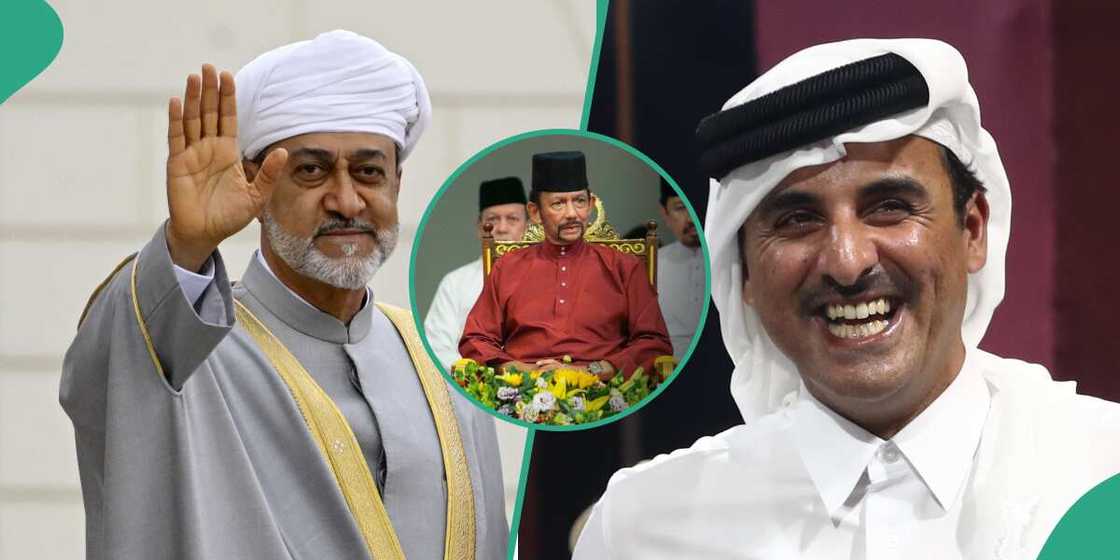Absolute Monarchy: List of Countries Ruled by Kings
- Going by what is obtainable in modern society, the system of governance has changed over time.
- Since the beginning of the new millennium, some countries have adopted a democratic system of governance.
- However, some nations (Qatar, Saudi Arabia and others) still practice the ancient monarchical system.
PAY ATTENTION: #StartupSouth Awards 2023 Nominated Legit.ng in the category Best Startup Coverage! Your support matters - click to VOTE for Legit.ng for free!
Absolute monarchy is a political system where a single monarch holds unlimited power and authority, unburdened by any constitutional or parliamentary restraint.
In an age where democracy and constitutional monarchies are more common, a few nations continue to embrace the tradition of absolute monarchy, where the ruler's word is law.

Source: Getty Images
In this article, we'll explore five countries that still maintain this ancient form of governance, delving into their absolute monarchies' unique characteristics.
From the opulent palaces of Brunei to the secluded realms of Saudi Arabia, these nations provide a fascinating glimpse into the enduring world of absolute monarchy in the 21st century.
1. Brunei
Brunei, officially known as the Sultanate of Brunei, is a sovereign state located on the island of Borneo in Southeast Asia. It is one of the few remaining absolute monarchies in the world.
The monarchical structure in Brunei is characterised by the paramount role of the Sultan in governing the country.
Sultan Hassanal Bolkiah has been the ruling monarch since 1967. The Sultan serves as both the head of state and the head of government, holding extensive powers over the administration and decision-making in Brunei.
The Sultan's role in upholding Islamic law, or Sharia law, plays a significant part in the governance and legal system of the country.

Read also
Nasarawa guber: PDP's Ombugadu to dethrone monarchs? Tribunal declared "governor-elect" reacts
2. Oman
Oman, officially known as the Sultanate of Oman, is a unique monarchy in the Arabian Peninsula.
In Oman, the Sultan is traditionally chosen from the ruling Al Said family, and his position is hereditary.
Sultan Haitham bin Tariq Al Said ascended to the throne in January 2020, succeeding Sultan Qaboos bin Said, who had ruled for nearly 50 years.
The Sultanate's legal framework combines traditional Islamic law (Sharia) and civil law. Furthermore, the Sultan has the authority to appoint and dismiss government officials, including ministers, and he plays a central role in shaping Oman's foreign policy and overall governance.
The Oman Council, known as the Majlis al-Shura, has an advisory role and provides input on various policy matters, but its decisions are not binding.
3. Qatar
Elsewhere in Qatar, the monarchy is absolute, and the political structure is headed by the Emir of Qatar, who serves as both the head of state and government.

Read also
Gaza War: Int’l affairs expert reacts as US sends fighter jets to bolster support for Israel
The Emir holds significant executive and legislative powers and is responsible for making critical decisions in the country.
The Al Thani family has ruled Qatar since the mid-19th century, and succession typically follows a line of hereditary rule within the family.
Sheikh Tamim bin Hamad Al Thani, who assumed the position in 2013, is the current ruler of Qatar.
4. United Arab Emirates (UAE)
The United Arab Emirates (UAE) follows a unique federal monarchical structure. It is a federation of seven emirates, each ruled by its hereditary monarch, known as an Emir.
These emirates are Abu Dhabi, Dubai, Sharjah, Ajman, Umm Al-Quwain, Ras Al Khaimah, and Fujairah. Among these, Abu Dhabi holds a particularly prominent role as the capital and the largest emirate in size and population.
The President of the UAE is selected from among the emirs of the individual emirates, with the President's position typically held by the Emir of Abu Dhabi.
This selection is made by the Supreme Council of Rulers, a council composed of the Emirs of the seven emirates.
The UAE's unique monarchical system combines traditional hereditary rule and a modern federal framework.
5. Saudi Arabia
Saudi Arabia is an absolute monarchy with a unique political structure. At the pinnacle of power is the King, who serves as the head of state and government. The King wields extensive authority, with the ability to issue royal decrees, appoint critical officials, and make important policy decisions.
The Saudi monarchy is known as the House of Saud, and the succession within the royal family is typically determined by the founding monarch's eldest and most capable son, King Abdulaziz Al Saud. This system ensures a degree of continuity and stability within the ruling family.
Beneath the King, the Council of Ministers, also known as the Council of Ministers of Saudi Arabia, plays a significant role in the decision-making process.
This council comprises various ministers who head different government departments and ministries, and it assists the King in policymaking and implementation.
The religious establishment, particularly the clerics of the Wahhabi interpretation of Islam, also wields substantial influence in the country. While Saudi Arabia has taken steps toward modernization and reform in recent years, the monarchical structure remains deeply entrenched in the nation's political landscape, with the King at the helm of this oil-rich kingdom.
British monarchs before Queen Elizabeth II
In another report, before the reign of Queen Elizabeth II, the United Kingdom witnessed the reign of several monarchs.
However, Queen Elizabeth II seems to be the most popular of them all and also the longest-serving ruler of the United Kingdom.
Before her, the United Kingdom had been ruled by eleven monarchs, with two queens before Queen Elizabeth II.
Source: Legit.ng





